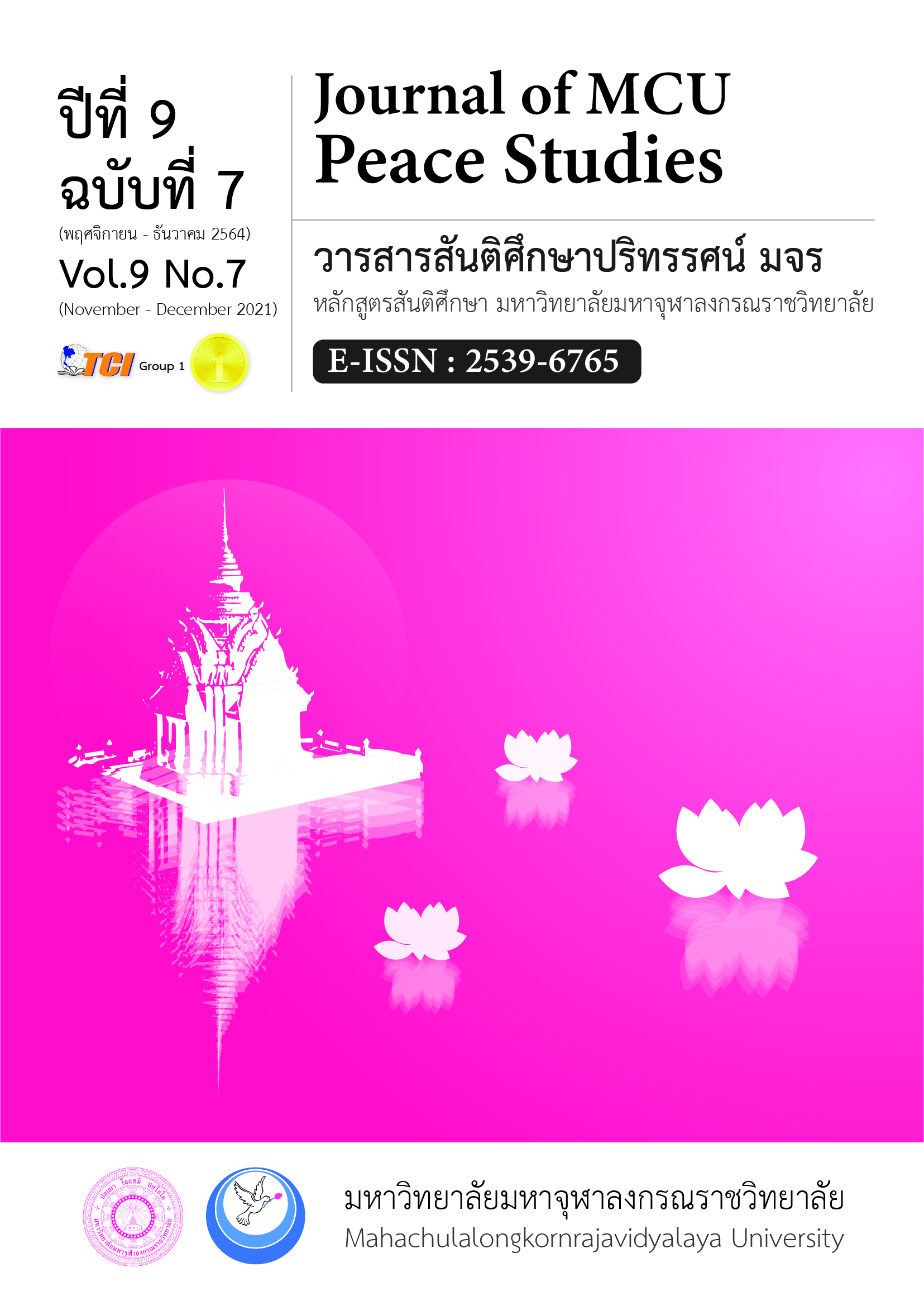The Process of Developing Rehabilitation of Murder Prisoners According to Buddhist Peaceful Means: A Case Study of Pattaya Remand Prison
Main Article Content
Abstract
The research article consisted of the following objectives: 1) to study and analyze the context of Pattaya Remand Prison, including the concepts and theories of criminology, the concepts of killing, and the concepts of rehabilitation development for inmates convicted of homicide; 2) to study and analyze concepts, theories, and methods of rehabilitation development for inmates convicted of homicide according to the Buddhist peaceful means; and 3) to present the rehabilitation development process for inmates convicted of homicide using Buddhist peaceful means in a case study of Pattaya Remand Prison. The study applied mixed-methods research by way of research and development (R&D). A sample group consisted of 40 inmates convicted of homicide. The research instruments for data collection were an interview form with 43 persons and focus group discussion with 13 experts. The acquired data were analyzed by mean of data classification techniques. From the study, the following results are found 1) The problems are discovered as follows: the operation of rehabilitation development for inmates due to the large number of inmates in Pattaya Remand Prison, the limited budget, the requirements for rehabilitation development, the arrangement of different vocational training activities for inmates in order to minimize recidivism, the insufficient staff for the work operations, the size of a prison used for rehabilitation program is too small, and the content of rehabilitation program is incompatible with the external labor market that inmates are unable to pursue a career when sentences are ended; 2) The tools used for rehabilitation development of inmates convicted of homicide in order for them to develop desirable behaviors are Trisikkhā (the Threefold Learning) as well as using the Buddhist peaceful means to lead a decent life, enhance morality, train the mind for purity, and improve emotional intelligence. While Bhāvanā (the Four Developments) are applied to evaluate the result of human development; and 3) The presentation of the rehabilitation development process for inmates convicted of homicide using Buddhist peaceful means in a case study of Pattaya Remand Prison is, therefore, the establishment of sustainable peace in society
Article Details

This work is licensed under a Creative Commons Attribution-NonCommercial-NoDerivatives 4.0 International License.
Views and opinions expressed in the articles published by The Journal of MCU Peace Studies, are of responsibility by such authors but not the editors and do not necessarily reflect those of the editors.
References
Chitsawang, N. (2003). Offender recovery program. Bangkok: WattapongKarnpim. Department of Corrections. (2019). Government action planB.E. 2016-2019. Retrieved August 5, 2020, from http://www.oic.go.th/FILEWEB/CABINFOCENTER11/DRAWER052/GENERAL/
DATA0000/00000124.PDF
Department of Corrections. (2014) Operational Certification Manual Fiscal Year 2014, Level of Prison / Correctional / Detention Center / Detention Center, Administrative System Development Group Department of Corrections, Ministry of Justice. Bangkok: Correctional Printing House.
Ingkasarnmanee, P. (2008). Problems in performing work according to the correction of rehabilitation programs of the Department of Corrections. (Master’s Thesis). Faculty of Social Work: Thammasat University. Bangkok.
Paopeng, N. (2015). Problems in working among officers working for Pattaya Remand Prison and guidelines for inmates’ behavior correction. (Master Thesis). Graduate School of Public Administration: Burapha University. Chonburi.
Pattaya Remand Prison. (2020). BriefingPattayaRemand Prison. Chonburi: Pattaya Remand Prison.
PhrakhruPhisai pariyatikit, & Plodphal, S. (2018). Human resource development in the organization of practice Trisikkha. Journal of MCU Social Science Review, 3(2),62-75.
PhraDhammakosajara (Prayoon Dhammajitto). (2006). Buddhist management approach. Bangkok: Mahachulalongkornrajavidyalaya University.
PhraDhammapitaka (Prayudh Payutto). (2000). Buddhadhamma, revised and defined. PhraNakhon Si Ayutthaya: Mahachulalongkornrajavidyalaya University Press.
PhraDhammapitaka (P.A. Payutto). (1998). Human rights: Social harmony or social disintegration. (2nded.). Bangkok: Sahadhammic.
PhraBhramagunabhorn (P. A.Payutto). (2019). Buddhism develops people and society. Retrieved October 19, 2020, from http://www.seameo.org/vl/payutto/index.htm
PhraPaisal Visalo. (1999). PhraDhammapitaka and the future of Buddhism. Bangkok: Wuttitham Foundation for Education and Vipassana.
PhraUdomsittinayok (KumpholKunungkaro/Malai). (2016). Human resource development in Buddhist approach. Journal Social Science, MCU, 5(2), 387-395.
PhraWanchai Candasâro (Kothhanam). (2017) . Behavioral development of prisoners as the buddhist approaches towards sangdhambambat program at the penitentiary in Amnatchareon Province. Humanities and Social Sciences Journal, UbonRatchathaniRajabhat University, 8(1), 244-256.
Strategy and Plan Division. (2019). Civil service workforce plan 2020-2022. Bangkok: Department of Corrections, Ministry of Justice.


